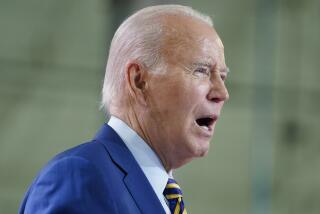Senate healthcare bill estimated to cost $829 billion over 10 years
- Share via
WASHINGTON — Senate Democrats pushing healthcare legislation received a boost Wednesday from congressional budget experts, who estimated that a bill being debated by the Senate Finance Committee would substantially expand coverage and lower the federal deficit.
The nonpartisan Congressional Budget Office calculated that the legislation, written by Sen. Max Baucus (D-Mont.), would cost $829 billion by 2019. But because that tab would be offset by spending cuts elsewhere and by new revenue, the bill actually would lower the deficit by $81 billion over the next decade -- and potentially even more in later years -- the budget office concluded.
At the same time, the bill would expand the percentage of Americans with health insurance from 83% to 94%, according to the estimate.
The preliminary CBO report sets the stage for the finance panel to vote on Baucus’ healthcare blueprint later this week or next -- a key step in the Democratic campaign to send President Obama a healthcare overhaul bill by the end of the year.
Once the finance committee votes, Senate Majority Leader Harry Reid (D-Nev.) will combine the panel’s legislation with a slightly different bill developed by the Senate health committee.
Reid, who hopes to bring the combined legislation to the Senate floor this month, is laboring to craft a bill that can win the support of both liberal and conservative Democrats to avert an expected Republican filibuster.
On Wednesday, Reid called the CBO report “another important step down the road toward enacting comprehensive health insurance reform.”
But Senate Minority Leader Mitch McConnell (R-Ky.) criticized Reid’s process, charging that the “real bill will be written by Democrat leaders in a closed-to-the-public conference room.”
House Democrats also are working to build a consensus before they bring their version of a healthcare overhaul to the full chamber for a vote. They met behind closed doors Wednesday to talk about ways to structure a new government-run insurance program. The group is slated today to discuss how to pay for the package.
In a speech to Congress last month, Obama set a cost goal of $900 billion over the next decade. But controlling spending and ensuring that a healthcare overhaul does not add to the national debt have remained among the most formidable challenges confronting Democrats.
(In another report issued Wednesday, the CBO concluded that the federal government’s $1.4-trillion budget deficit in 2009 reached 9.9% of the nation’s gross domestic product, the highest level since 1945.)
All of the Democratic Party’s major healthcare bills would help more Americans get benefits by expanding Medicaid, the joint federal-state insurance program for the poor, and by creating highly regulated insurance marketplaces in which people could shop for insurance. Millions of those customers would qualify for government subsidies.
To offset the cost of those initiatives, Democrats have proposed a series of taxes, as well as reduced spending on Medicare, the federal government’s insurance program for seniors.
Baucus managed to restrain the cost of his bill in large part by offering less federal assistance to people who would be required to buy insurance than is contained in the more liberal legislation developed by House Democrats and by the Senate health committee.
But under pressure from liberal Democrats and some Republicans, the Senate Finance Committee has moved to expand aid for individuals and for small businesses to help them provide their workers with health benefits. The committee’s bill also lowered the proposed penalties for those who do not comply with a new insurance mandate, and limited how many people would be subject to an excise tax on high-end -- or so-called Cadillac -- health plans.
The changes nonetheless did not add substantially to the cost of the legislation, according to the Congressional Budget Office, which estimated that Baucus’ original proposal would have cost $774 billion over the next decade.
--
More to Read
Get the L.A. Times Politics newsletter
Deeply reported insights into legislation, politics and policy from Sacramento, Washington and beyond. In your inbox twice per week.
You may occasionally receive promotional content from the Los Angeles Times.











